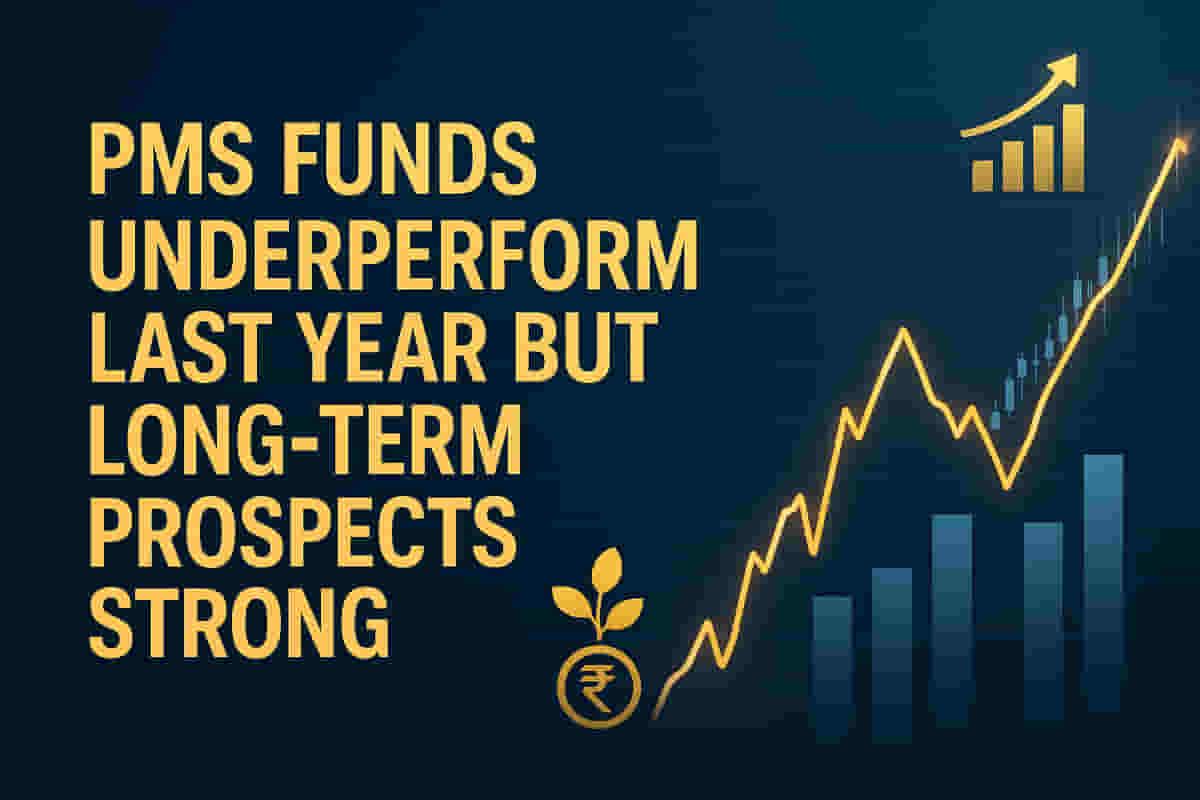PMS Providers delivered negative returns last year, but long-term performance remains strong, experts say.
Economy
|
1st November 2025, 10:23 AM

▶
Short Description :
Detailed Coverage :
Most Portfolio Management Service (PMS) providers have experienced negative returns over the last year, despite generally stronger performance over three and five-year periods. For instance, the ICICI Prudential PMS Contra Strategy, managing ₹12,110 crore in Assets Under Management (AUM), and ASK India Entrepreneurs portfolio, with ₹10,484 crore AUM, delivered absolute negative returns of 3 per cent and 9 per cent respectively in the year ending September. However, over five years, these funds, following multi and flexi-cap strategies, have provided 28 per cent and 14 per cent CAGR respectively. Similarly, White Oak Capital Management India Pioneers Equity saw a 5 per cent negative return and ValueQuest Platinum Scheme a 13 per cent negative return over one year, while their five-year returns were 16 per cent and 19 per cent. Marcellus Investment Managers' Consistent Compounders large-cap strategy returned -11 per cent in one year and 13 per cent in five years. The small-cap strategy of Aequitas Investment India Opportunities Product, with ₹3,826 crore AUM, showed strong returns of 25 per cent and 32 per cent over three and five years. George Heber Joseph, CIO & CEO (Equity) at ASK Investment Managers, explained that short-term underperformance is due to global interest rates, elections, and geopolitical issues. He noted that PMS funds avoid lower-quality, high-beta, and momentum-driven segments, focusing instead on business quality and earnings durability. He also mentioned temporary valuation compression in sectors like consumer and financials due to sustained Foreign Institutional Investor (FII) selling. Prabhakar Kudva, Director and Principal Officer - Portfolio Management Service at Samvitti Capital, is optimistic about the next year, expecting it to be better as global issues resolve. He stated that PMS funds typically perform better than Mutual Funds (MFs) in bull markets due to a more aggressive portfolio construction with higher allocations to small and mid-cap stocks, and worse in bearish phases. He doesn't see current specialized MF products as direct competition.
Impact This news impacts investors by highlighting the risks associated with short-term underperformance in PMS schemes, while also reinforcing their potential for long-term wealth creation. It guides investors to look beyond one-year metrics and understand the strategic choices made by fund managers. For the industry, it underscores the importance of strategy and investor communication during volatile periods. Rating: 6/10.
Heading Difficult Terms: Portfolio Management Service (PMS): A professional service where a money manager handles a client's investment portfolio on their behalf. AUM (Assets Under Management): The total market value of all investments managed by a financial firm. Absolute negative returns: A loss in investment value over a specific period, expressed as a percentage. CAGR (Compounded Annual Growth Rate): The average annual rate of return of an investment over a period longer than one year. Multi-cap strategy: An investment approach that allocates funds across large, mid, and small-cap stocks. Flexi-cap strategy: A strategy allowing fund managers flexibility to invest across all market capitalizations based on market conditions. High-beta: A stock or investment whose volatility is higher than the overall market. Momentum-driven segments: Market areas or stocks that are experiencing rapid price increases due to strong buying interest. Business quality: Refers to the inherent strength and sustainability of a company's operations and its ability to generate profits. Earnings durability: The consistency and predictability of a company's future profits. Valuation compression: A decrease in the market price of an asset relative to its intrinsic value or earnings. FII (Foreign Institutional Investor): An investment institution based outside India that invests in Indian financial markets. Cyclical rebound: A recovery in economic activity or market performance following a downturn. Derivatives: Financial instruments whose value is derived from an underlying asset. Hedging: A strategy employed to reduce the risk of adverse price movements in an asset. Bear market: A period of prolonged price declines in a financial market. Bull market: A period of prolonged price increases in a financial market.